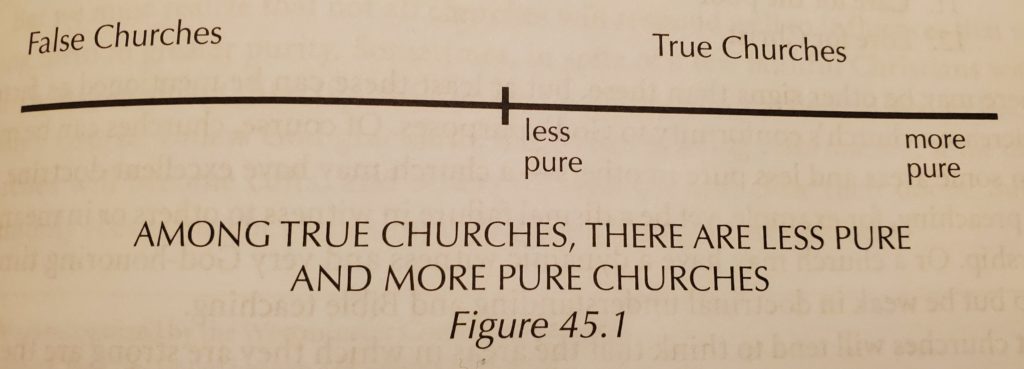Reading Systematic Theology with Wayne Grudem – What makes a church more or less pleasing to God? What kinds of churches should we cooperate with or join?
This post is part of a 50+ post series from the classic work by Wayne Grudem (PhD, Cambridge), Systematic Theology: An Introduction to Biblical Doctrine. The aim of each post is to provide an overview of each chapter in the book and related resources for each topic.
Synopsis of Chapter
In his next chapter on the purity and unity of the church, Wayne Grudem distinguishes between more pure and less pure churches. Grudem defines purity, provides signs for more pure churches, gives a brief history of organizational separation in the church, and provides legitimate reasons why separation should happen.
Definition and Signs of a More Pure Church
In the previous chapter, we learned there are true churches and false churches. However, among true churches some churches are more and less pure. The purity of the church can be defined as “freedom from wrong doctrine and conduct, and its degree of conformity to God’s revealed will for the church.”

According to Paul, Christ’s goal for the church is that “that he might sanctify her, having cleansed her by the washing of water with the word, so that he might present the church to himself in splendor, without spot or wrinkle or any such thing, that she might be holy and without blemish.” (Ephesians 5:26-27) With that in mind, the New Testament seems to highlight certain areas where the church is judged as “more pure”. These include:
- Biblical doctrine (or right preaching of the Word)
(Titus 1:9; Jude 1:3) - Proper use of the sacraments (or ordinances)
(1 Corinthians 11:17-34) - Right use of church discipline
(1 Corinthians 5:6-7, 12-13) - Genuine worship
(Ephesians 5:18-20; Colossians 3:16-17) - Effective prayer
(John 15:7; Philippians 4:6) - Effective witness
(Matthew 28:19-20; John 13:34-35) - Effective fellowship
(1 Thessalonians 5:11; Hebrews 10:25) - Biblical church government
(1 Timothy 3:1-13) - Spiritual power in ministry
(Acts 1:8; Romans 1:16; 1 Corinthians 4:20) - Personal holiness of life among members
(1 Thessalonians 4:3; Hebrews 12:14) - Care for the poor
(Acts 4:32-35; Romans 15:26; Galatians 2:10) - Love for Christ
(1 Peter 1:8; Revelations 2:4)
The Unity of the Church
Although the purity of the church is very important, it cannot be the sole concern of a church. Focusing only on purity would further divide the church into smaller factions. That’s why it’s important to work for the unity of the church as well. The unity of the church can be defined as “its degree of freedom from division among true Christians.”
Jesus emphasized the unity of the church. In his high priestly prayer, Jesus prayed that his people “may all be one, just as you, Father, are in me” (John 17:21). Throughout the rest of the New Testament, we see a periodic emphasis for unity in the church. For instance, in Paul’s letters (1 Corinthians 1:10; Philippians 2:2, Ephesians 4:3), there are numerous times the Apostle expressed a desire for church unity.
The desire was so strong for unity, Paul instructed the churches to remove those who caused divisions. He said, “I appeal to you, brothers, to watch out for those who cause divisions and create obstacles contrary to the doctrine that you have been taught; avoid them. For such persons do not serve our Lord Christ, but their own appetites” (Romans 16:17-18). So unity in the church is important and false division is strongly condemned. But there seems to be another case to be made for church separations.
Reasons for Separation
There are both wrong reasons and right reasons to separate. Wrong reasons would include things like personal ambition, pride, or differences on minor doctrines and practices. On the other hand, there are good, biblical reasons to separate. These include major doctrinal reasons and reasons of conscience. Admittedly, this can be a difficult area to navigate, but it’s important to address when reviewing the unity of the church.
The first reason to separate in church is major doctrinal errors in other believers – especially teachers. Second John 10-11 tells us “If anyone comes to you and does not bring this teaching, do not receive him into your house or give him any greeting, for whoever greets him takes part in his wicked works.” Not separating from certain teachers stands in opposition to the New Testament. In other words, being a good Christian requires separation at times.
This is one of the reasons Protestants separated from the Catholic Church during the Reformation. On one side, teachers were removed from the visible church. Martin Luther was excommunicated from the Catholic Church in 1521 and the Anglican church was removed in 1570. On the other side, groups of believers began to organize themselves during this time as separate congregations. This time would be an example of major theological disagreements causing a good separation.
A second reason to separate are when matters of conscience dictates believers separate from each other. Paul says, “Do not be unequally yoked with unbelievers. For what partnership has righteousness with lawlessness? Or what fellowship has light with darkness?” (2 Corinthians 6:14). We should not be connected with unbelievers in ministry. For instance, we should leave our church when our conscience will not allow us to continue in ministry with unbelievers.
Application: Purity and Unity are Both Important
In considering the practical aspects of this chapter, it’s important to recognize the importance of both purity and unity. Each aspect is vitally important. The church must strive for greater purity in the Lord. Without that aim, we will drift into sin and neglect. It’s part of our sin nature. On the other hand, we must not neglect working toward the unity of the faith with other true believers. Making distinctions between truth and error can have a divisive effect in the church if left unchecked. While pursuing purity, we should guard against a divisive spirit and be “eager to maintain the unity of the Spirit in the bond of peace.” (Ephesians 4:3)
“so that we may no longer be children, tossed to and fro by the waves and carried about by every wind of doctrine, by human cunning, by craftiness in deceitful schemes. 15 Rather, speaking the truth in love, we are to grow up in every way into him who is the head, into Christ, 16 from whom the whole body, joined and held together by every joint with which it is equipped, when each part is working properly, makes the body grow so that it builds itself up in love.” (Ephesians 4:14-16)
Special Terms
- Eastern church
- purity of the church
- separation
- unity of the church
- Western church
Resources: Wayne Grudem
- Wayne Grudem: Book: Systematic Theology: An Introduction to Biblical Doctrine
- Wayne Grudem: 148 Lectures on Systematic Theology
Related Resources
- OpenBible.info: Verses on the Unity in the Church
- OpenBible.info: Verses on the Purity of the Church
- Eric Landry: False Teaching and the Peace and Purity of the Church
- Orthodox Presbyterian Church: Biblical Principles of the Unity of the Church
- John Piper: What is Christian Unity?
Image credit: Cleaner Wet Pearl by cromaconceptovisual.








